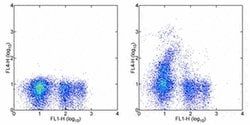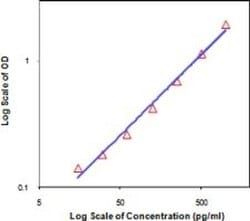CD117 (c-Kit) Monoclonal Antibody (ACK2), eBioscience™, Invitrogen™
Manufacturer: Fischer Scientific
Select a Size
| Pack Size | SKU | Availability | Price |
|---|---|---|---|
| Each of 1 | 50-128-32-Each-of-1 | In Stock | ₹ 14,685.00 |
50-128-32 - Each of 1
In Stock
Quantity
1
Base Price: ₹ 14,685.00
GST (18%): ₹ 2,643.30
Total Price: ₹ 17,328.30
Antigen
CD117 (c-Kit)
Classification
Monoclonal
Concentration
0.5 mg/mL
Formulation
PBS with 0.09% sodium azide; pH 7.2
Gene Accession No.
P05532, P10721
Gene Symbols
KIT
Purification Method
Affinity chromatography
Regulatory Status
RUO
Gene ID (Entrez)
16590, 3815, 64030
Content And Storage
4° C
Form
Liquid
Applications
Flow Cytometry, Functional Assay, Immunohistochemistry (Frozen), Immunoprecipitation, Western Blot
Clone
ACK2
Conjugate
Unconjugated
Gene
KIT
Gene Alias
belly-spot; Bs; CD117; ckit; C-Kit; c-KIT gene1; c-kit protein; c-kit proto-oncogene protein; c-kit receptor; c-kit receptor tyrosine kinase; dominant spotting; Dominant white spotting; Fdc; Gsfsco1; Gsfsco5; Gsfsow3; KIT; kit oncogene; KIT proto-oncogene receptor tyrosine kinase; KIT proto-oncogene, receptor tyrosine kinase; mast cell growth factor receptor; mast/stem cell growth factor receptor; mast/stem cell growth factor receptor Kit; MGF; p145 c-kit; PBT; Piebald trait protein; protein kinase; proto-oncogene c-Kit; proto-oncogene tyrosine-protein kinase Kit; receptor tyrosine kinase c-kit; receptor tyrosine kinase type III; SCFR; SCO1; SCO5; Sl; soluble KIT variant 1; SOW3; spotted sterile male; Ssm; Steel Factor Receptor; Tr-kit; tyrosine kinase receptor; tyrosine kinase receptor c-KIT; tyrosine-protein kinase Kit; v-kit Hardy-Zuckerman 4 feline sarcoma viral oncogene homolog; v-kit Hardy-Zuckerman 4 feline sarcoma viral oncogene-like protein; W
Host Species
Rat
Quantity
100 μg
Primary or Secondary
Primary
Target Species
Human, Mouse, Rat
Product Type
Antibody
Isotype
IgG2b κ
Related Products
Description
- Description: The ACK2 monoclonal antibody reacts with mouse CD117, also known as c-Kit receptor, Steel factor receptor and stem cell factor receptor
- A member of the tyrosine kinase receptor family, this 145 kDa molecule is expressed by a majority of hematopoietic progenitor cells characterized in the mouse bone marrow as a small subset of cells positive for Sca-1 and Thy1 (Thy1^lo) and negative for lineage markers
- The interaction of the mouse c-kit receptor and steel factor promotes the proliferation and differentiation of hematopoietic progenitor cells
- CD117 is also expressed by mast cells and plays a role in signaling and activation of these cells
- ACK2 has been reported to be a blocking antibody
- Applications Reported: The ACK2 antibody has been reported for use in flow cytometric analysis, immunoprecipitation, immunoblotting (WB), and immunohistochemical staining of frozen tissue sections
- It has also been reported for use in functional assays
- (Please use Functional Grade purified ACK2, cat
- 16-1172, in functional assays.) (Fluorochrome-conjugated ACK2 is recommended for use in flow cytometric analysis.)
- Applications Tested: The ACK2 antibody has been tested by flow cytometric analysis of mouse bone marrow cells
- This can be used at less than or equal to 0.125 μg per test
- A test is defined as the amount (μg) of antibody that will stain a cell sample in a final volume of 100 μL
- KIT (c-KIT) is a proto-oncogene and a type 3 transmembrane receptor for MGF (mast cell growth factor, also known as stem cell factor)
- KIT was first identified as the cellular homolog of the feline sarcoma viral oncogene v-kit
- KIT together with its ligand regulates growth and activation of a variety of hemopoietic and non-hemopoietic cells
- Mutations in KIT are associated with gastrointestinal stromal tumors, mast cell disease, acute myelogenous leukemia, and piebaldism
- Recently, deregulation of the KIT receptor TK by the prevalent activation loop mutation D816V has served as a focal point in therapeutic strategies aimed at curbing neoplastic mast cell growth
- c-Kit is expressed in hematopoietic stem cells, germ cells, mast cells and gastrointestinal tract cajal cells
- Upon binding of its ligand stem cell factor (SCF), c-kit dimerizes, resulting in receptor activation and autophosphorylation of various tyrosine residues including tyrosine 703 located on the cytoplasmic domain of the receptor
- This modification allows docking of Grb2 and activation of the Ras/ERK signaling pathway
- SCF/c-kit can activate multiple downstream signaling pathways including PI3K, PLC-gamma and JAK/STAT
- c-kit receptor activation is essential for hematopoiesis, stem cell maintenance and gametogenesis.




